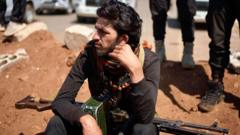The fragile ceasefire in Syria's Suweida province, which recently faced severe sectarian violence, is barely holding as tensions escalate between Druze fighters and Bedouin militias. According to BBC reports, despite the presence of Syrian troops tasked with enforcing the ceasefire, the situation remains critically unstable, with both sides prepared to resume armed conflict should hostilities reignite.
Having come within six miles of the contested city of Suweida, reports indicate that the area is rife with dangers, including active snipers and deserted villages, illustrating the harsh conditions many residents are grappling with. The streets, once bustling with life, now show signs of destruction—shops burned and shells littering the ground, stark reminders of recent clashes. Young Syrian army soldiers are seen taking brief rests in this grim environment, clearly illustrating the exhaustion from ongoing confrontations.
The ceasefire was initiated just four days ago to halt a week of conflict that escalated into one of the most violent periods for the Druze community, with losses estimated at over 1,000 deaths. While the explicit goal of peace is present, tensions remain palpable, with Bedouin fighters claiming they may once again take up arms unless their demands for hostages are met.
Eager to support the injured, the Syrian Red Crescent has begun making efforts to evacuate victims from the violence, though the access remains perilously unsafe. Eye-witness testimonies from soldiers and medical coordinators paint a dire picture, revealing inadequate medical supplies and urgent needs among those affected by the warfare.
"This situation is catastrophic," stated a Red Crescent coordinator, who was able to evacuate some wounded individuals but expressed doubts about the safety of future missions.
As the precarious ceasefire continues to hold, the hope for a stabilized future hangs in the balance amidst numerous challenges, as community leaders and local representatives emphasize the necessity of collaboration for achieving lasting peace. The shadows of violence loom large over Suweida, leaving many questioning what lies ahead for this fractured region.
















